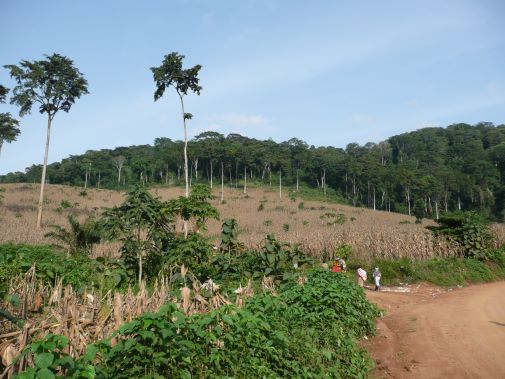Cost to protect globally important forests falls disproportionately on those living closest
Posted on 30 August 2023

Border between maize fields and forests. Credit: Marije Schaafsma
But international funding could help smallholder farmers to boost yields on their existing land to incentivise long-term forest protection.
Biodiversity conservation delivers enormous global economic benefits, but net benefits vary widely for different groups of people - with international stakeholders gaining most, and local rural communities bearing substantial costs.
These are the findings of a decade-long study into the costs and benefits of conserving the forests and woodlands of Tanzania’s Eastern Arc Mountains - a global biodiversity hotspot estimated to provide nature-based benefits to the world equivalent to US $8.2 billion.
Substantial conservation costs
Climate regulation is the primary global benefit from protecting large areas of tropical forest. And although the people living near these forests feel some of this benefit, they also bear substantial conservation costs – particularly through the loss of potential income gained by clearing trees to expand farming.
“International gains from the conservation of this biodiversity hotspot far outweigh the gains to local communities directly involved in their conservation,” said Andrew Balmford, Professor of Conservation Science at the University of Cambridge and senior author of the paper.
He added: “Local rural communities are not incentivised to protect globally important natural habitats. Understandably, their need to make a basic living– which often involves clearing forests and woodlands for agriculture, timber and charcoal – has to come first.”
Carbon sinks
Intact tropical forests act as ‘carbon sinks’, removing carbon dioxide from the atmosphere and helping to regulate the global climate. Conversion of these natural habitats to agricultural land results in vast carbon emissions.
The researchers estimate that international funding of US $2 billion is needed to support people living near forests and woodlands of global importance in Tanzania’s Eastern Arc Mountains.
Investments could support smallholder farmers to enhance the productivity of their existing farmland, reducing the need to clear more trees to meet the growing local demand for food.
Boosting yields
“Investments that help farmers boost yields on their land would potentially provide a long-term solution to the pressure on natural habitats, without compromising local food production or livelihoods,” said Pantaleo Munishi, Professor of Ecosystems, Biodiversity and Climate Change Management at Sokoine University of Agriculture, Tanzania, a co-author of the study.
He added: “Farmers degrade natural resources in search of livelihood options, due to declining productivity on land they own.”
The study also found that the greatest overall global economic gains come from the most biologically important sites – but these are also most costly for locals to conserve. This means that without financial support, the incentives to clear natural habitats are highest in the most biologically important places.
Biologically important
“If we're serious about retaining these globally important places for society as a whole, the international community ought to be contributing more and not relying on local people to soak up these costs,” said Dr Phil Platts at the University of York and BeZero Carbon, first author of the report.
He added: “Although vastly more money is required for the conservation of key regions than the international community is spending at the moment, in the wider scheme of things it’s entirely doable.”
“The huge demand for cropland in Tanzania, not just from smallholders, leads to clearing forests and woodlands - many of which aren’t formally protected. Smallholders are pushed further and further into the mountains because they need to make a living,” said Dr Marije Schaafsma at Vrije Universiteit Amsterdam, one of the study’s lead authors.
A network of protected areas
This is the largest and most detailed study of its type ever undertaken in the tropics. The results are published today in the journal Environmental and Resource Economics.
Tanzania’s Eastern Arc Mountains are considered a global priority for conservation, and following extensive forest clearance, local and national governments have established a network of protected areas to help to conserve the remaining biodiversity and sustain ecosystem services.
The Eastern Arc is home to almost 500 species of plants not known to exist anywhere else in the world and many unusual animals including a tree-dwelling crab, and a monkey previously unknown to western science called the kipunji.
Enable equitable conservation
As well as supporting biodiversity, the forests draw carbon dioxide from the atmosphere, are home to widely used medicinal plants, provide drinking water to major cities, and support national and international tourism. But conserving them also leads to loss of potential income from agriculture and timber sales, and incurs significant management costs.
“Tropical forests should be viewed as essential global infrastructure, and richer countries have a responsibility to step up and enable their conservation in an equitable way,” said Professor Brendan Fisher at the University of Vermont, a co-author of the study.
